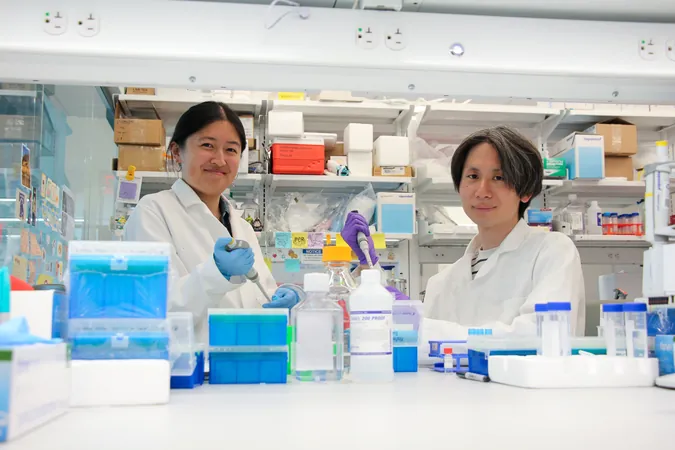
Revolutionary Discovery: New Phenol-Enhanced mRNA Vaccines Slash Side Effects and Boost Efficacy
2025-07-18
Author: Arjun
Goodbye Pain, Hello Gain!
If you've ever experienced soreness or malaise after receiving an mRNA vaccine, you know the discomfort all too well. However, scientists may have cracked the code to minimize these side effects while maximizing the vaccine's effectiveness!
Innovation at Penn: A Game-Changer in Vaccine Technology
In groundbreaking research published in Nature Biomedical Engineering, a team from the University of Pennsylvania has unveiled a revolutionary modification to the lipids within mRNA vaccines. By altering the structure of these ionizable lipids, they achieved a dual win: reduced inflammation and enhanced vaccine performance against diseases like COVID-19 and even cancer.
What’s the Secret Ingredient?
The secret? Introducing phenol groups—natural compounds known for their anti-inflammatory benefits, commonly found in healthy foods like olive oil. Michael J. Mitchell, Associate Professor of Bioengineering, puts it succinctly: "By essentially changing the recipe for these lipids, we were able to make them work better with fewer side effects."
Revamping Established Chemistry for Innovative Results
Traditionally, the ionizable lipids used in lipid nanoparticles (LNPs) were crafted through simple chemical reactions. But the research team took a creative leap by employing the century-old Mannich reaction, allowing them to generate a diverse array of new lipids. This innovative approach led to the creation of hundreds of novel lipids, significantly changing the vaccine landscape.
Less Inflammation, More Power!
The results were astounding. The phenol-containing lipid, dubbed C-a16, not only minimized inflammation but also significantly outperformed existing mRNA technologies during various tests. With lower oxidative stress, these new lipids enable LNPs to deliver their payloads more effectively, showing promise in enhancing gene-editing technologies like CRISPR and improving cancer vaccine potency.
Transforming Gene Therapy and Cancer Treatments
In preclinical trials, researchers tested the C-a16 lipids on mice. Remarkably, the results showed 15 times brighter luminescence from a gene that makes fireflies glow compared to current treatments. Furthermore, the C-a16 lipids successfully improved CRISPR's ability to correct genetic anomalies, doubling its efficacy against a rare genetic liver disease.
A Milestone in Cancer Treatment
When it came to cancer, C-a16 lipids demonstrated unparalleled effectiveness in shrinking tumors. In melanoma models, treatments using these lipids were three times more successful than standard mRNA vaccine formulations. Moreover, they empowered cancer-fighting T cells to better identify and eliminate tumor cells while generating less oxidative stress.
A Major Leap for COVID-19 Vaccines!
In their experiments with COVID-19 mRNA vaccines, the immune response in animal models was a staggering five times stronger than conventional formulations. "These new phenol-containing lipids can enhance a wide range of LNP applications by causing less disruption to cellular machinery," explained postdoc Dongyoon Kim.
The Future Looks Bright!
As researchers continue to explore the potential of phenol-enhanced lipids, the future for mRNA vaccines looks incredibly promising. The team's findings suggest that re-evaluating time-honored chemical reactions can lead to astonishing advancements in modern medicine. "It's thrilling to think about what other historical processes might be rediscovered and adapted for today's medical challenges," said Mitchell. This revolutionary discovery could reshape how we approach vaccination, offering safer and more effective solutions for generations to come.


 Brasil (PT)
Brasil (PT)
 Canada (EN)
Canada (EN)
 Chile (ES)
Chile (ES)
 Česko (CS)
Česko (CS)
 대한민국 (KO)
대한민국 (KO)
 España (ES)
España (ES)
 France (FR)
France (FR)
 Hong Kong (EN)
Hong Kong (EN)
 Italia (IT)
Italia (IT)
 日本 (JA)
日本 (JA)
 Magyarország (HU)
Magyarország (HU)
 Norge (NO)
Norge (NO)
 Polska (PL)
Polska (PL)
 Schweiz (DE)
Schweiz (DE)
 Singapore (EN)
Singapore (EN)
 Sverige (SV)
Sverige (SV)
 Suomi (FI)
Suomi (FI)
 Türkiye (TR)
Türkiye (TR)
 الإمارات العربية المتحدة (AR)
الإمارات العربية المتحدة (AR)